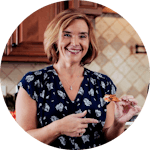Diet Doctor podcast #48 — Jen Isenhart
Filmen visar också vad vi kan göra åt problemen. Den ger ett hoppfullt budskap när den följer läkare och nutritionister och visar hur de kan påverka patienternas liv med lågkolhydratkost.
Dokumentärer om nutrition är en utmaning. Regissörens beslut är avgörande: Hur detaljerat ska man gå in på varje ämne? Hur mycket ska man beröra den vetenskapliga bakgrunden? Hur mycket tid ska läggas på inspirerande berättelser? Och vilket perspektiv ska man ta?
Jen och jag diskuterar detta och mycket mer i denna engagerande intervju.
Tack för att du läser,
Bret Scher, MD FACC
Tidigare avsnitt hittar du här.
Innehåll
2:25 Välkommen, Jen Isenhart
3:40 Så skapade Jen dokumentären Fat Fiction
6:30 Jens förhållningssätt till jäv
9:10 Manusprocessen
10:50 Att undvika jäv genom att presentera problem och lösningar
13:25 Jens erfarenhet av dr Lenskez och hans patienter
15:50 Inspiration från Jens research med läkare och patienter
19:35 Jens research kring kostråden
20:55 Olika missförstånd kring kostråden
23:32 Fettsnål kost och kostråden
26:30 Problem med vegetabiliska oljor
30:30 Olika kostval
31:45 Reaktioner på filmen
33:55 Jens framtida projekt
35:08 Här hittar du dokumentären Fat Fiction
37:17 Uppdatering om filmen
Transkription
Dr. Bret Scher: Welcome to the Diet Doctor podcast with Dr. Bret Scher. Here we are again with another remote podcast interview and this time it’s with Jen Eisenhart who is the founder of Wide Eyed Productions, a video production company based in Idaho and she’s already won five Emmy’s.
She’s done a number of different documentaries about Idaho, about salmon, about nature and now she’s taken on the topic of nutrition. Specifically the nutrition of fat in the dietary guidelines, how we’ve been led astray as a country and sort of what are some of the details about that.
And really this film has a message of hope and it about what we can accomplish with a broader look at nutrition, specifically focusing on low-carb. And there are wonderful interviews with physicians and a lot of the preeminent people in the low-carb world and some actual footage of doctors and their patients and this message of hope of what a doctor-patient interaction can and should look like and the power that all this has.
So, in this interview we talk about her personal experience, her motivation for making the film, but also we have to be honest with ourselves, and the nutritional community as a whole and certainly the low-carb community has some mythology and has some just accepted beliefs about what the dietary guidelines say or what we think about vegetable oils.
And a documentary like this has to sort of toe the line; how much of the details do you do versus how much of the general picture do you portray. So I think this interview talks about some of that and hopefully you’ll enjoy this to hear some of the process that Jen and her company went through in making this film and then also the reach it has and how it can impact people and help people.
So, enjoy this interview with Jen Eisenhart and make sure you check out our YouTube channel for Diet Doctor and DietDoctor.com where you can see all of our information to make low-carb simple to see how you can incorporate it into your life to transform your health, and even reach your clinicians and your physicians with our CME course and our material specifically for clinicians. Thanks a lot.
Jen Eisenhart, thank you so much for joining me on the Diet Doctor podcast today.
Jennifer Eisenhart: Thanks for having me on, Bret, I appreciate it.
Bret: Well, I I’ve got to be honest, I’m a little biased in this interview, because I’m very thankful for you including me in this documentary that you did, called Fat Fiction. It was a pleasure to be part of it. I got to say, even though I was in it, I think it’s a fantastic documentary, I think the production quality is so good, I really love the message, the people involved are top-notch and I think you did a wonderful job producing it and making it come to life.
And I want to hear some of the background from you, what got you interested in this topic, specifically? And give us a little bit of your process on how you came to this journey of making this documentary.
Jen: Yes, so I guess it’s a long– Well, it was a long time ago when I realized even as a kid that I just really had a problem with sugar. Whenever I would eat sugar I would just feel badly and I didn’t really know why.
And actually at one point I went through diabetes testing as a child. It was thought that I maybe had diabetes because I would have these hypoglycemic events. But I also really loved sugar and so I think I was just getting myself really buzzed on sugar and then crashing. So, I didn’t really have so much of a weight struggle as I just knew that I had trouble with sugar and I decided about two and half years ago to take a sugar detox class.
And during that class, in fact the first night of the class, the instructor who was a nutritional therapist said, you know, not only do you need to cut out sugar, but you need to be eating a lot more fat. And that surprised me– including saturated fat, you know, was the message.
And I had spent my career working as a news journalist and, you know, I can’t tell you how many interviews I did over the course of my career with nutritionists and dietitians, you know, just warning of the dangers of saturated fat and of fat in general. I grew up in the low-fat era and so I experienced that whole phenomenon that surrounded that era. So I started digging into this information, I started doing more research of my own and I just realized that there really hadn’t been a comprehensive film done about how we kind of got the story so wrong about that.
And other films had kind of touched on it in various ways, but I felt like, you know, really stepping through the history and also the science in a measured way could be a valuable thing for a lot of people.
Bret: So, it started as that personal journey and then sort of became your mission to put that out to the world for everybody to hear.
Jen: Yeah, and in fact also I have close family friends who are type 2 diabetic, have type 2 diabetes and they’ve really struggled with that disease and lost, you know, limbs in fact to that horrible disease. And so I felt a reason to work on it, on the project, for those friends too.
Bret: But let’s be honest when it comes to nutritional documentaries, the ones that are out there– from my perspective are pretty bad. Because a documentary is supposed to be as close to the truth, however you define the truth as possible. And seems like, you know, a lot of these mostly vegan documentaries, when you look at the ratio of propaganda to science or accuracy it’s very heavily weighted in my opinion towards propaganda.
Now they may not think so, the people who put these on may not think so. So how did you approach it from that standpoint to say how you wanted to do this in terms of, you know, propaganda versus science? And I guess the hardest part of the question is how do you get out of your own bias as you’re going through it, to say, ”Am I hitting the right checkmarks?”
Jen: Yeah, I think it’s difficult for all of us to get out of our own bias, but what I did in order to do that I just reached out to the top people I could connect with in the field, the people that appear in the film. I mean these are leaders in the low carbohydrate movement. So first of all I reached out to those people and connected with them and set up interviews and consulted and dug into the story from that perspective.
Another thing that we did is we didn’t accept any food industry funding which as a small production company I can tell you it’s a very difficult thing to do to, you know, not take those dollars that could potentially influence the way the film came out or could give a perceived bias to the film.
So we intentionally did this as a bootstrap production, you know, we did a couple of Indiegogo campaigns, with individual donations that come in through an Indiegogo campaign. So we intentionally didn’t accept any of that kind of funding to keep the film as unbiased as we possibly could.
Bret: That’s great. Did you get offers that you actually had to turn down?
Jen: We had people talk to us about, ”You really should go after this company or that company. You know, they could help you fund it.” Because it was a struggle to get the film completed from a financial standpoint, for a small company. But we just, you know, stuck to our guns and didn’t take it. And it took us a little longer to finish the film, but then I wish we could have maybe gotten it done a little sooner, but I’m glad we did it the way we did it.
Bret: Now did you go back and did you watch What The Health and Game Changers and Cowspiracy…? Did you watch those as like your homework on either how to do or how not to do a nutritional documentary?
Jen: Yeah, I definitely did. I’ve watched so many nutritional documentaries and read so many books too. I mean that was a real challenge too, because the folks we interviewed, you know, a lot of these folks have two and three books out. So just doing all of that research, reading the books, watching the other films and then… you know, you’re right, I mean, unfortunately a lot of these documentaries set the bar pretty low in terms of production and how the films are presented being, you know, obviously from someone’s point of view.
So we tried to raise that bar and produce a piece that we could be proud of, but not just that that we’d connect with the general public… a lot of time and attention was spent to the script in writing it in a way that was accessible to a broad range of people who might not want to read a nutrition book. You know, my dad is a perfect example. He is somebody who would love to watch a documentary like Fat Fiction, but he’s not going to pick up a book, a nutrition book.
He likes to read, but he is not going to pick up a nutrition book and read about, you know, how he can get his health back. But he will watch a film. And so those were the people that we really tried to direct the film toward.
Bret: It’s a good point. I guess I should clarify when I say the bar is set pretty low, I think the bar set really high from a production standpoint and basically a glorified commercial standpoint. I mean, What The Health and Game Changers, they were very well done, but I think that the accuracy and the bias was just raging in those… the accuracy was low and the bias was high.
And so I think it’s very tough for a filmmaker, for you, to really walk that line because you have a point you’re trying to make. I guess you have to be careful in how far you go to make that point. So did you have anything to be a check and balance on you as you were going through that? That was a kind of maybe hard question.
Jen: Yeah, there is a tough line, because I’ve also seen films that just present the problem and don’t offer a solution and that, you know, in the effort to be unbiased. So I think our film could be accused of being biased because we do present low-carb as an opportunity for people to reverse type 2 diabetes. But we very specifically did not take a position on being vegetarian low-carb, being vegan low-carb.
I mean these are options… we very intentionally didn’t want to get into that fight because– And that’s actually one of the things that I really appreciate about Diet Doctor, is presenting options for people who have all different kinds of ways that they like to eat for ethical reasons, religious reasons… So, we very intentionally didn’t want to get into that fight.
But I think that someone could accuse the film of being biased, because we do present the low carbohydrate diet as a great way to reverse many chronic diseases.
Bret: And I think that’s a good point, you’re not just presenting the problem with no solution, because then someone is left saying, ”Well, what do I do? Now what?”
Jen: Yes. And then there are other very good nutrition films that have done that. They focused on the problem, the entire film was spent on the problem, and then as the credits roll, there is a couple of ideas for maybe how you could eat. And so I didn’t want to do that either. I didn’t want to be, you know, I didn’t want to lose the message in trying not to take any position at all.
Bret: Right, right. Now, one of the things that I really love about the film is that it shows what a doctor-patient relationship or doctor-patient interaction can be and should be. I mean, the way you followed Dr. Brian Lenzkes and it was Alyssa Gallagher.
Jen: Yeah.
Bret: You followed them and their interactions with their patients and their clients and the message of hope. And I mean what I hope is that people watching would say that’s the kind of doctor I want to have, that’s the interaction I want to have with my doctor. Because it can be that message of hope and it’s unfortunately not what so many people see or have in their interactions. So I’m curious as you were going through this, following Dr. Lenzkes, seeing his patients, I mean, I’m sure you could feel that and what was that experience like for you?
Jen: It was such a cool experience. And thank you; you were the one who told me about Brian Lenzkes when we interviewed you in Denver. And I was so appreciative that you told me about him and I immediately started pestering him. I think he had to call you back and trying to figure out, who is this girl who keeps calling me?
But yeah, we went down and spent three days with Brian and filming with him and filming with his patients. And it was so wonderful, I mean, just as you described it, so hopeful. It was so great to see a physician becoming, you know, more than just a health coach, but a cheerleader and the team is winning, you know.
Bret: Yeah.
Jen: And it was just wonderful to be a fly on the wall and to get to interview his patients. We set up a panel of five of his patients and interviewed them. And I don’t think Brian had even really absorbed what he had done for these people until that moment and he got really choked up.
He was in the back of the room and, you know, had tears coming to his eyes, you know, just hearing and witnessing his patients talk about what he’s done for them and for their lives. I mean, I know he knew that at a certain level, but I think it kind of hit him all at once to hear his patients lined up and talking about what an amazing change it’s been for their lives.
Bret: It’s so powerful.
Jen: It was very cool.
Bret: Did you have other moments as you were going through this, that surprised you or really inspired you as you were doing your research and filming the film?
Jen: Yeah, well Alyssa Gallagher, she is a local dietitian and certified diabetes educator here in Boise and it was fantastic to connect with her and hear her story, because, you know, Prof. Tim Nokes’s story and Gary Fettke’s story, we’ve heard very much about in the news about them being vilified and attacked, you know, for practicing low-carb. But here’s a local gal right here in my own small community who was afraid to speak out and afraid to practice low-carb.
So she had to do it very quietly at first because she saw that there’s some pillars of the low-carb community being attacked and threatened with losing their licensure, you know, over practicing this. But she continued, you know, and here’s someone who’s just really bravely helping patients in her own small community.
And so it was pretty neat to connect with her and hear her story and then also hear the story of her patient Judy, who was so wonderful, who spent so much time with us and shared her story with us and who is still on her journey, but is doing really well. So that was a neat experience. And the other really fun thing was the continuous glucose monitor experiment. That was really fun.
Bret: Right, so that was a great part of the film which I didn’t know was going to be in it until I saw it. I thought, wow, that was really cool, so you didn’t actual– your own little mini experiment. You had three people wearing continuous glucose monitors, eating a low-carb high-fat diet and then switching to a low-fat higher carb diet and you had them tracked, what their CGM readings were and how they were feeling. And the result, I guess maybe we shouldn’t give it away as a spoiler, but the result was pretty clear, which everybody favored in, which their bodies favored with the CGM.
Jen: Yeah, and the people going into it weren’t sure which one they were going to favor. But then it was universal… our very small cohort here. But, yeah, they all three experienced very similar results and it was kind of disturbing and a little bit scary actually the first day when they switched from the low carbohydrate week, which we did the first week, to the low-fat week, which we did the second week.
One of the gals on the first day on the low-fat week, I mean, her blood sugar shot up over 200 and she was worried about that. She was just like, I don’t know if I I’m going to make it the whole week. She did end up making it the whole week, but she didn’t enjoy it very much.
Bret: And I think it’s interesting, these were not people who were already low-carb or keto. This was new to them.
Jen: Yeah.
Bret: That’s a great part of it and it’s not a scientific experiment; it’s three people but it sure made for interesting footage and in food for thought, so to speak.
Jen: Yeah, yeah.
Bret: Now, the other big part, the other big message of the film is how we were led astray, basically, from the dietary guidelines from the 1950s to the 70s to now, how the path has sort of led us down a path of telling us what we should eat and how it really hasn’t worked out. So what kind of research did you put into learning about all that? Because that’s something that a lot of people just take for granted.
Jen: Yeah, it started with Nina Teicholz’s book, The Big Fat Surprise, reading her book, reading Gary Taubes’ books and doing it– you know, reading their in-depth research that they’ve spent decades collecting and then reaching out to them and talking to them, consulting with them and interviewing them; we actually interviewed Nina on two separate occasions for the film and learning all about the research that she has done.
Which is a lot of what we do with the documentary, is we reach out to the top experts in the field and we interview those people and we tap into their expertise to share with the film. Then we also did our own research and looking at some of the studies, for example, the Minnesota coronary experiments and going back to those original documents and looking at that information in order to tell that story correctly.
Bret: So it’s clear you had a lot of homework and research to do about the dietary guidelines. Now one of the interesting things that’s prevalent in the nutritional world and certainly in the low-carb world, is there are some subtle misunderstandings of the dietary guidelines in the language we use that sort of gets passed down? And of course at Diet Doctor we have Adele Hite on our team who did her entire research, her PhD thesis, on the nutritional guidelines, so she knows more about the nutritional guidelines than probably most people.
And I’ve learned a lot from her about mistakes I’ve made just in the way I verbalize, you know, what the dietary guidelines are, how they influence the food pyramid, whether it’s a low-fat diet, and so I’m curious as you’ve gone through this, has some of that kind of now processed in your brain too to say, ”Oh these are some misconceptions that we have”?
Jen: Yeah, I feel like the film stepped through in a very thoughtful way. The net effects of the dietary guidelines and the explosion of the processed food industry and our increased consumption of sugar due to, you know, taking the fat out of these foods and so it increased sugar in all these processed foods.
And I felt like we really stepped through that pretty well in the film and that it wasn’t one single thing. But I think maybe our use of saying that low-fat diet is maybe what triggered Adele– And in my mind we were discussing the net effects of the era of the low-fat diet and all that, you know, like the dietary guidelines were kind of the match that lit the flame on this series of things that coincide with the launch of the obesity epidemic.
And I think someone said it pretty well. She said, you know, it’s not causation. We can’t say that it definitely caused it. But sure as anything, we need to look at, you know, what happened around 1980 and what could’ve caused this. And so that’s what we attempted to do, was to step through the various things that happened during that era, and how that impacted or may have contributed to the obesity epidemic.
Bret: Yeah, that’s a great summary, I really like how you said that. Because I think that’s where we get into trouble, where we say the dietary guidelines caused the obesity epidemic or the low-fat diet caused the obesity epidemic, but the way you described it there was perfect. And I think, you know, some may say it doesn’t matter because the dietary guidelines set up the situation and the environment for the diet to fail basically.
So it was destined to fail from the beginning especially once the process food companies came in and said, we are going to lower the fat in your diet, people are going to be hungrier, we can market low-fat, healthy foods that are now high in carbohydrates, high in sugar, high in seed oils. And people started eating that, you could say indirectly or directly, because of the environment that was created by the dietary guidelines.
Jen: Yeah, yeah, exactly. And, you know, I lived through that era. I remember everything was low-fat, low-fat, low-fat, cut the fat, cut the fat. There was such a focus on fat and yes, the dietary guidelines also told us to cut sugar.
They did, but what happened though was the focus became low-fat, and the formularies for all those processed foods just included more sugar. Because when you take the fat out of food, you know, as Sarah Hallberg said in the film, instead of tasting like cardboard, at least it can taste like sweet cardboard. Yeah, I loved that one.
Bret: Which I find so interesting about the guidelines, because it was lower the fat and lower the sugar, but somehow it was still enough to say it’s healthy as long as you lower the fat regardless of the sugar. So somewhere in there, it’s like almost the people were turning a blind eye to the sugar part of it, and that’s where all these conspiracy theories come in.
But I’ve heard you say that no, you’ve been on records saying, ”I don’t think it was a conspiracy theory.”
Jen: Yeah, it does seem to me from the research that we’ve done, I mean the people at the time were recommending what they thought was the healthiest way for people to eat. But I do feel like from the interviews we’ve done and the research we’ve done that what happened is they jumped ahead of the science and made recommendations that weren’t placed in sound science. And unfortunately it just kicked off this storm of events that just built up and they definitely didn’t prevent the obesity epidemic, let’s put it that way.
Bret: Right and then that was their job. Their job was to promote something, some recommendation that would help the population be healthier and instead it went the opposite way. So at its best it failed to do its job, at its worst, it contributed… and you can sort of decide where in there it lies, I guess, right?
Jen: And also you have to eat something, right? So if you cut back on fat, you have to eat something. And in many cases, and we say that in the film, that something else is carbohydrates.
Bret: Right.
Jen: And especially starchy carbohydrates is where we tended to go with it.
Bret: Right. Now, did you do much research also on things like vegetable oils, which are a little outside of the dietary guidelines? That’s sort of like its own special unique situation that also has some misconceptions and some debate even within low-carb and healthy communities.
Jen: Yeah, yeah, I had quite a few conversations with a gal, Dr. Jilani, at the University Minnesota. She’s conducting some pretty amazing research. We couldn’t end up interviewing her in the film, but she allowed us to use her research and her studies. And she just drove around the restaurants in her neighborhood and bought French fries and fried foods and took them back to her lab and tested those foods.
And what she found were compounds of aldehydes, toxic aldehydes, that are, you know, just not good for us. So, her research was a lot of what we set that story upon. And then we also looked at the Minnesota coronary experiments and, you know, the interviews with you and Nina and Andrew Mente, who is an obesity researcher involved in the PURE study. And so, yeah, that’s how we structured that story.
Bret: And it is a fascinating story because there’s so much conflicting evidence and the mechanistic evidence looks so damning for vegetable oils and seed oils because the mechanistic evidence… just looks like they’re terrible. And then you have randomized controlled trials like the Minnesota coronary experiment and then you have observational trials that show no people who have more seed oils do better than those who don’t, so you have to scratch your head and get into all the nuanced details.
And I think this brings up an interesting point for a documentary like you’re trying to create. You need to know where to draw that line, like where are we getting too much into the weeds? And we’re going to start to lose people. And it’s too much detail, but yet enough detail to satisfy people that we’ve really looked into this and are answering it appropriately. So that’s a hard role for you as well, isn’t it?
Jen: It is a hard role, but to me, initially the film was actually called The Big Fat Lie and in my mind the big fat lie and why I wanted to title it that was when we were told to quit eating natural fats and we were told to begin eating processed fats, processed industrial seed oils that would be more healthy for us. And at the time those were trans fats. You know, when we at first were told to switch to processed vegetable oils at that time they were trans fats.
And so that was a terrible recommendation to make to the general public. And Jason Fung goes into that in detail in the film. And so I did want to include that in the film. And I understand there is still some debate about the healthfulness of processed vegetable oils, but I definitely think it was worth discussing the fact that when we first were told to switch to those, they were trans fats and that was not a good thing to switch to at that time.
Bret: And my conclusion, I’ve done talks and videos about the dietary guidelines, and my conclusion is always, should we really be asking the government what we should eat? And did you kind of come to that same conclusion that this was misguided from the beginning and we need to get away from it? Or did you have hope that we can sort of redo the guidelines in a way that will be more beneficial?
Jen: Yeah, that’s a really good question. I think that the work of The Nutrition Coalition, Nina Teicholz’s work to try to add a true low carbohydrate option to the dietary guidelines is a worthwhile effort. Because the dietary guidelines do affect so many food programs in this country.
I think it would be pretty tough to unravel that at this point, because they affect our school lunch programs, they affect food programs for the elderly, for the military, there’s all these food programs that we’re involved in.
And if we just eliminate the dietary guidelines, well, then how would we decide how could– you know, what would be the means by which we then decide how these food programs can formulate the food? So it feels like it would be pretty tough to unravel that. So I think pushing for a true low-carb option in the dietary guidelines would be a good thing to focus on.
Bret: Yeah, it’s certainly an uphill battle, but hopefully–
Jen: Yeah, sure seems like an uphill battle.
Bret: Pushing for actual science and pushing for low-carb option, which sort of go together, so it’s interesting.
Jen: Yeah.
Bret: Well, how has the film been received? What have you heard from either the public and critics and, you know, the vegan side of things? I’m curious, what have you heard from all that?
Jen: Surprisingly we haven’t heard much from the vegan side of things. I thought we might be subject to criticism there, but, you know, in my heart of hearts I wanted to include the vegan community in our film. You know, we didn’t take a position on that for a reason, because it’s not a keto versus vegan film, you know. It’s a how to get your health back film. And there is a variety of ways you can do that.
The reviews on the Amazon platform where we get most of our viewership, have been amazing. You know, people talking about how finally now my father-in-law gets it, you know, he’s never understood it until he saw your film and you now he finally understands it, he’s gone low-carb and he’s cut his insulin medication in half, you know, already.
And there’s just review after review after review like that of people who are able to receive the message through a film form that maybe they hadn’t been able to receive prior to this. So that’s been really exciting and I am just so happy that the film could have that kind of positive effect. And that’s been the majority of the feedback on the film. It’s just been overwhelmingly positive.
Bret: That’s got to feel great to read those reviews and know you had a hand, a big hand, the majority of the hand in making that happen, that’s impressive.
Jen: Yeah, I’m just glad that it can help people. I’m just… it’s just so wonderful to be able to put something out into the world, but, you know, people don’t have to buy anything, they don’t have to– it’s not a gimmick, you know, it’s just good information that people can use to help take their health back.
Bret: So, what’s next? Are you going to do more nutritional documentaries or you’re going to move on to something else? What do you think?
Jen: Well, we’re kind of looking at a couple of different projects right now. We actually also have been working on some really great project for one of the world’s great conservation organizations that’s dedicated to protecting birds of prey around the world. So we’ve been working on that project and that’s been pretty fascinating. And yeah I think we’ll probably keep a hand in this nutrition world.
We’re definitely in support of the film, putting out more clips and more information on social media just to help people find the film and support the film. We have so much great material. I mean, just the interview that we did with you, I was just talking to our editor about that today… There is so much more material that didn’t make the final film, so we talked about maybe doing some other little clips that could be helpful and informative and support the film, so we’ll see.
Bret: Don’t worry, I’m not offended if part of my interview got cut off. There was so much good quality in there that I understand why mine didn’t make it. Don’t worry, I’m okay with that. Where can people find it? Because I know you mentioned Amazon and I know you can set up screening, so tell us more about that too.
Jen: Yeah, so the film is on Amazon. So just go to Amazon and search up Fat Fiction, you’ll find it there. Our website is fatfiction.movie so we always keep that updated. So it’s kind of appearing on new platforms as time goes on, so I’m going to check there to find out where it is. And then, you know, we released on March 13th, which was I think the Friday before the lockdown happened for Covid 19 and so we had 50 screening set up across the country for the film in theaters and they all had to be canceled.
But we’ve switched to doing some virtual watch parties on a platform called FanForce TV and that has been fine-tuned and is working pretty well. We did one just last week with the Nutritionist Down South who hosted a virtual watch party with a whole bunch of her clients. And what’s fun about that is everybody signs up, watches the film altogether at the same time and then we’ve had people participate in a Q&A afterwards.
You’ve participated in a couple of those, which we really appreciate. And that has been really cool because then after the film plays people can ask more questions and get even deeper understanding of how they could adopt this kind of lifestyle. So the virtual watch parties have been pretty cool and those are on FanForce TV and you can find out how to host a watch party on our website.
Bret: Very good. Thank you I really appreciate you taking the time to be with us here today to talk about your film and the impact it’s having on people; I think that’s pretty impressive.
Jen: Thank you, Bret, I appreciate you having me on, I really do, and I appreciate your support for the film and appreciate you taking the time to be in the film and also in the Q&A’s. I know you are a super busy guy and we really appreciate you taking the time to do it.
Bret: Yeah, my pleasure. I look forward to hearing more from you in the future.
Jen: Thank you.
Om videon
Inspelad i maj 2020, publicerad i juni 2020.
Värd: Dr Bret Scher.
Producent: Hari Dewang
Klippning: Hard Day Production
Tipsa andra
Gillar du Diet Doctor Podcast? Hjälp gärna andra att hitta den genom att lämna ett omdöme på iTunes.
 Kurser
Kurser





